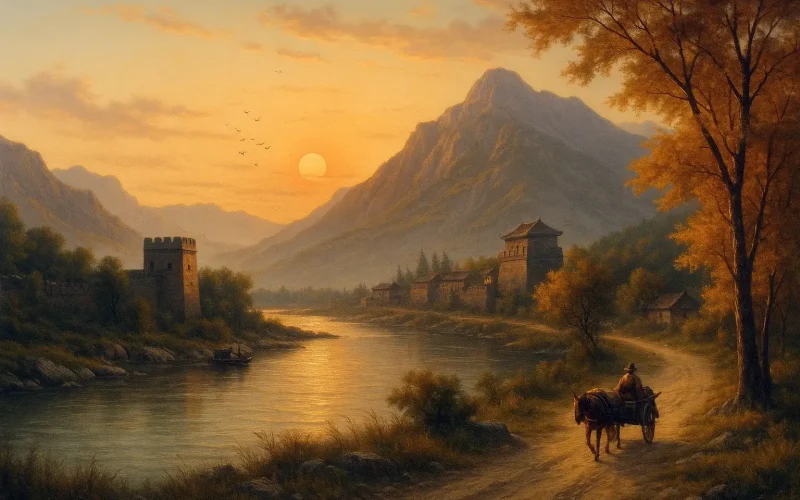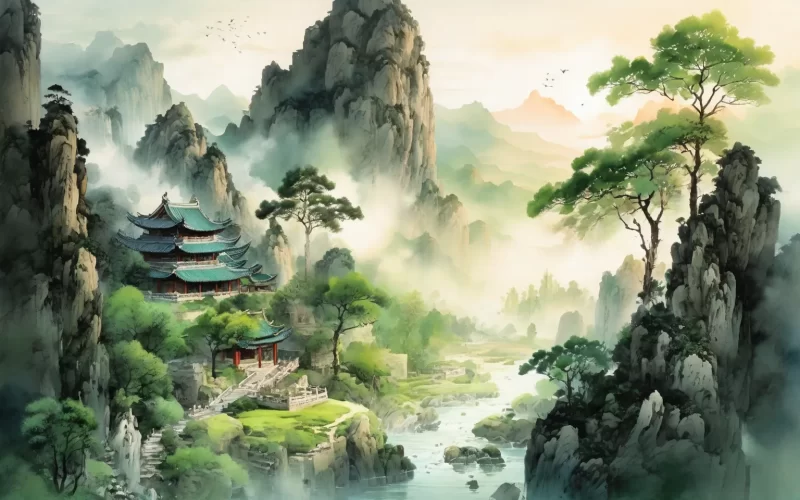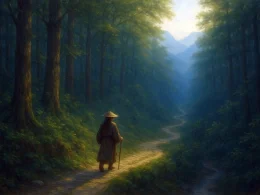The limpid river, past its bushes
Running slowly as my chariot,
Becomes a fellow voyager
Returning home with the evening birds.
A ruined city-wall overtops an old ferry,
Autumn sunset floods the peaks.
...Far away, beside Mount Song,
I shall close my door and be at peace.
Original Poem
「归嵩山作」
王维
清川带长薄, 车马去闲闲。
流水如有意, 暮禽相与还。
荒城临古渡, 落日满秋山。
迢递嵩高下, 归来且闭关。
Interpretation
Composed in autumn 734 AD during Emperor Xuanzong's Kaiyuan era, this poem was written by Wang Wei while journeying to reclusive Mount Song after completing mourning for his mother. Having experienced officialdom's vicissitudes, he gradually grew weary of political life, finding solace in Buddhist philosophy and nature. As one of China's Five Sacred Mountains, Mount Song symbolized his pursuit of tranquility beyond worldly concerns. The landscapes described reflect both physical scenery and the poet's nuanced psychological transition—from relief to fleeting melancholy, then to serene clarity—embodying his increasingly detached worldview.
First Couplet: "清川带长薄,车马去闲闲。"
Qīng chuān dài cháng bó, chē mǎ qù xián xián.
"Clear streams ribbon through lush greenery; / My carriage moves with leisured liberty."
The opening depicts departure scenes: pristine waters, thriving plants, and unhurried travel convey newfound freedom after leaving official burdens. The "leisured" pace reflects inner peace rather than literal slowness.
Second Couplet: "流水如有意,暮禽相与还。"
Liú shuǐ rú yǒu yì, mù qín xiāng yǔ huán.
"Flowing waters seem to understand; / Evening birds return wing to wing as planned."
Nature mirrors the poet's resolve. The purposeful stream echoes his determination, while homing birds recall Tao Yuanming's imagery, symbolizing retirement after bureaucratic weariness.
Third Couplet: "荒城临古渡,落日满秋山。"
Huāng chéng lín gǔ dù, luò rì mǎn qiū shān.
"Ruined city overlooks ancient ferry; / Setting sun gilds autumn peaks—so merry?"
Four stark images ("ruins," "ancient," "sunset," "autumn") create desolation. The scenery triggers subdued melancholy during his journey's middle passage.
Fourth Couplet: "迢递嵩高下,归来且闭关。"
Tiáo dì sōng gāo xià, guī lái qiě bì guān.
"After long miles at Mount Song's base, / I'll close my gate, embrace seclusion's grace."
The conclusion affirms his retreat. "Long miles" suggests both physical distance and spiritual transcendence, while "closed gate" declares his renunciation of worldly engagements, achieving final equanimity.
Holistic Appreciation
Progressing from scenery to sentiment, the poem traces an emotional arc from serenity through pensiveness to resolution. Wang Wei masterfully projects inner states onto landscapes—clear streams, homing birds, autumn mountains—creating profound scene-emotion fusion. His understated elegance conveys resignation without bitterness, embodying refined detachment.
Artistic Merits
This poem exemplifies Wang Wei's signature style of "painting within poetry and poetry within painting," demonstrating his exceptional ability to mirror human emotions through natural landscapes. The four couplets successively convey distinct emotional cadences - transitioning from the opening's serene leisure, through the middle section's subdued melancholy, to the concluding peaceful return - progressing layer by layer with effortless fluidity. With its refreshingly elegant language and profound artistic conception, the work showcases Wang Wei's masterful artistic composition and exceptional emotional expressiveness.
Insights
Beyond documenting a career transition, the poem models spiritual homecoming through nature. It reminds us that true freedom emerges not from external circumstances but from inner alignment—finding in mountains and streams what politics cannot provide. Wang's journey remains eternally relevant for anyone seeking meaning beyond societal rat races.
Poem translator
Kiang Kanghu
About the poet

Wang Wei (王维), 701 - 761 A.D., was a native of Yuncheng, Shanxi Province. Wang Wei was a poet of landscape and idylls. His poems of landscape and idylls, with far-reaching images and mysterious meanings, were widely loved by readers in later generations, but Wang Wei never really became a man of landscape and idylls.












